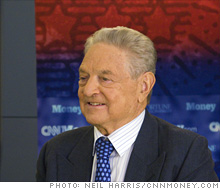George Soros: China a 'positive force'
The billionaire financier George Soros says that China's economy will grow faster than people expect and so will its global economic influence.
 |
| Investor George Soros believes China's clout in the global economy will continue to increase. |
SHANGHAI (Reuters) -- Financier George Soros said on Sunday that China's global influence is set to grow faster than most people expect, with its isolation from the global financial system and a heavy state role in banking aiding a relatively swift economic recovery.
He reiterated his cautious views regarding the surge in global stock markets, although he said it may have further to go given liquidity in the markets and that many investors are still sitting on the sidelines.
"In many ways, Chinese banking has benefited from being isolated from the rest of the world and is in better shape than the international banking system," he told an audience at Shanghai's Fudan University.
China's extensive capital controls have helped to shield its financial institutions from the worst of the global financial crisis.
"The influence of the state is also greater. So when the government says 'lend', banks lend," Soros added. "This puts China in a better position to recover from the recession and that is in fact what has happened."
New loans by Chinese banks surged to record levels in the first quarter, spurring optimism over recovery prospects for the world's third-largest economy.
"China is going to be a positive force in the world and the market, and as a consequence, its power and influence are likely to grow. Personally, I believe it's going to grow faster than most people currently expect," Soros said.
He acknowledged that some doubts remain over China's economic recovery, however, noting data such as a continued fall in electricity consumption.
He also noted that China's aggressive 4 trillion yuan ($586 billion) economic stimulus program, announced last year, had bolstered the economy.
"If that program proves inadequate, it is in a position to apply additional stimulus. China is also in a position to foster a revival of its exports by extending credit and investing abroad," he said.
He reiterated his view that because China's economy is only one-quarter the size of the U.S. economy, it cannot replace the American consumer as the motor of the global economy, so global growth will be slower than in the past.
He sounded a more upbeat note for China's asset markets than for global markets overall, where he remained wary.
"I'm pretty cautious. Even though I've said prices are cheap, I'm not so optimistic as to put all my money into stocks or assets because I think that the outlook is fairly uncertain.
"I do, however, think that the Chinese economy is a promising economy. I think here it is more a matter of finding the right assets rather than saying that I'm not interested in investing."
Asked if the recent climb in global stock markets was a bear market rally, he said: "It may have further to go because there is a lot of liquidity, a lot of investors are on the sidelines. If the market keeps on going up, more of them may decide to join in. You never know how far the rally goes."
"But I certainly don't think we are at the beginning of a big bull market worldwide." ![]()

